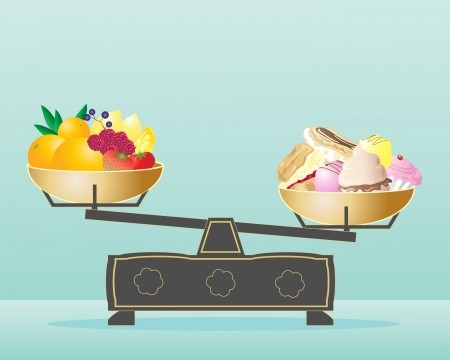Diets high in fruits, vegetables and other foods with fewer calories per bite may lower an older women’s risk of breast cancer compared to women who eat lots of high calorie-dense foods, suggests a new study. The findings suggest the link is independent of overweight and obesity, a risk factor for postmenopausal breast cancer.
The study was published in The Journal of Nutrition.
In this study researchers looked at energy density, the amount of calories in a certain weight of food, typically a gram. Cakes, ice cream and other foods heavy in oils and added sugars are high in energy density. Low energy-dense foods are higher in water and fiber, making these foods generally lower in calories for every gram. Vegetables, fruits and many unprocessed grains are generally low in energy-density.
The study analyzed data from almost 57,000 postmenopausal women who had no history of breast cancer.

In 1999, the women had answered questions about what they ate and other lifestyle questions. The researchers then estimated the energy density of each woman’s diet, based on foods. (Nuts, seeds, wheat germ and olive oil were not included because these foods provide important nutrients and would not play a role in weight gain when consumed as part of a typical diet.)
After an average of almost 12 years, 2,509 of the women were diagnosed with breast cancer.
The study found that women consuming diets with the highest energy densities were 20 percent more likely to be diagnosed with breast cancer than those eating the least energy-dense diets. This association took into their age, reported activity and other recognized risk factors. When adjusting for body mass index, a measure of obesity, the link was only slightly lower for women consuming the most energy-dense diets compared to the least.
Like many studies based on dietary data, there is the possibility of recall and measurement errors. There is also the chance that these women changed their diet during the course of the study, although a small group of the participants were asked again about what they ate in 2003 and this showed the women’s diet had remained relatively stable over the years.
It is also challenging to separate out the independent effect of diet from obesity, the authors note. In this study, women who consumed diets highest in energy density were eating about 200 calories a day more than those who consumed the least energy-dense diets. Those eating high-energy dense diets were also taking in more fats and less fiber.
Eating a diet low in energy density is one of AICR’s Recommendations for Cancer Prevention. These foods will give you plenty of healthy nutrients and other compounds studied for their role in cancer prevention. It will also help you get to or stay a healthy weight.
Study authors reported no funding for this study.
For other ways to lower breast cancer risk, visit our Learn More about Breast Cancer section.





